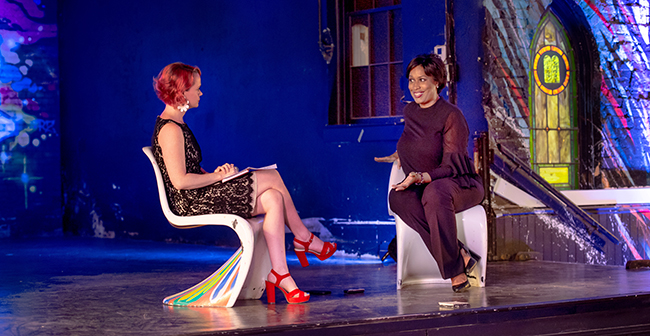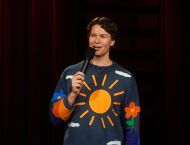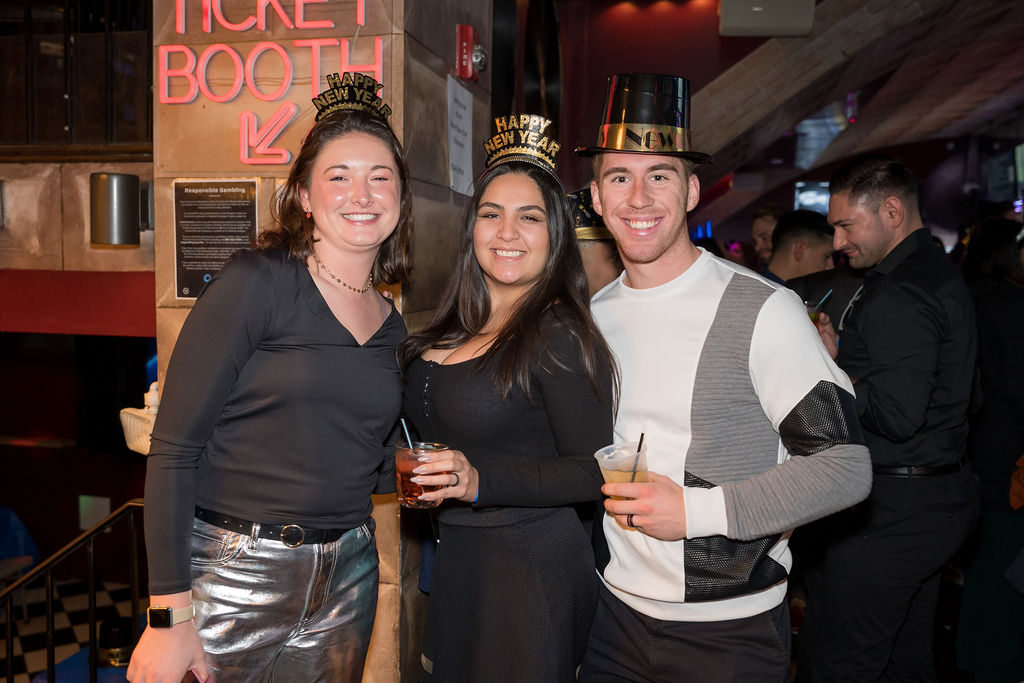Culture
 Monica Alford interviews Mayor Muriel Bowser at Culture House DC // Photo: Rich Kessler
Monica Alford interviews Mayor Muriel Bowser at Culture House DC // Photo: Rich Kessler
Mayor Muriel Bowser Talks DC’s Grit, Growth and Cultural Authenticity
August 2, 2019 @ 12:00am
Mayor Muriel Bowser lights up when I ask about her 1-year-old daughter, Miranda. I’m curious about what mom-and-daughter adventures they embark on around the District, but more importantly, I want to know how she juggles being at the helm of DC government with motherhood. She urges moms to give themselves a break and do the best they can, but she’s honest that it’s a balancing act. Striking that constant balance extends beyond carving out quality time with her baby while leading DC. It’s apparent that she is simultaneously supportive of the city’s longtime residents while also embracing the changing economic landscape. From releasing the DC Cultural Plan and creating the Office of Nightlife and Culture to hiring bright millennials ready to lead in director-level positions, it’s clear that she strives for forward-thinking initiatives. As I sat across from Mayor Bowser on the stage of community art space Culture House DC, I caught a brief but powerful glimpse of what our city’s cultural heartbeat means to her and how she plans to preserve it.
On Tap: How have you watched the DC economic landscape shift over the past decade as the city’s become a foodie destination and arts and culture hub? Do you view this as a positive impact on the city overall?
Mayor Bowser: I think it’s outstanding that many, many more restaurants have located and created more jobs in hospitality. We have welcomed Michelin star ratings to the city and people are definitely talking about how the food scene has exploded. I think it’s all positive.
OT: How do you predict the arrival of Amazon will impact the DC area? Do you have concerns that we’ll experience a shift in affordability and accessibility due to the surrounding tech areas and overall tech industry?
MB: We’ve been focused during my entire tenure on how to create more affordable housing for Washington, DC and I’m very proud that we’ve been able to add thousands of new units. We have 20,000 units in the pipeline. But we know we have to do a lot more. By the year 2025, we have to add 36,000 new housing units to DC alone. For us to continue to be competitive and track down people and keep and retain families in the District, we know we have to [provide] competitive housing.
OT: What measures are you taking to support long-time residents with concerns about gentrification? How can the city protect the local community while also embracing growth?
MB: Well, it takes everybody, right? It takes the government. It takes the community. It takes people who’ve lived here for five generations like my family, and people who are just moving to DC. Everybody finds something that they love about our town – that it’s growing, we’re improving [our] schools, parks, recreation, walkability, public transit – you name it, we have it. But there is a certain grit about Washington, DC that’s beloved and should be treasured.
OT: Almost one year into your second term, what are your core priorities for the city? What high-level initiatives are you currently most focused on? What are some of the biggest impacts you hope to make over the course of the next three years?
MB: We continue to be laser-focused on housing. I see making DC more affordable as one of the most important things I can do in my second term. We have been focused on affordable units. We’re also focused on creating new jobs that are paying good, sustaining salaries. And that’s not just in tech, even though we’ve made a big play in tech and we were named again one of the best places for women in tech, and we’re attracting founders in startup companies and capital to come help those companies grow. We are also going into our fifth year of 202Creates. That’s where we promote the creative economy in DC and make sure people know that you can really earn a living in the arts here in DC. We’re talking about all art forms, housing, [and] affordable [and] creative spaces, and making sure people know that they can make a living in the arts.
OT: How do you stay connected to the local community? How do you make yourself accessible to locals to make sure voices are heard, especially minorities and communities in need?
MB: We have very robust outreach [programs]. Last year, we formed a new Office of Nightlife and Culture (MONC). We do find that a lot of our newer residents don’t connect in more traditional ways to government, and so going to them where they are and connecting to them in many ways is super important. Our Office of Nightlife and Culture works with the business community and community groups to make sure our nightlife economy is thriving and forward-looking.
OT: MONC Director Shawn Townsend certainly had stiff competition, with 500-plus other applicants. Why was he the right fit for the role, and why did this office feel necessary at this time for our city?
MB: There were a lot of applicants. It has been kind of a maiden voyage as an office. It was important for us to focus its mission – and the mission is not all business, it’s not all community. It’s focused on how we can promote our nighttime economy. We have people from around the region coming to Washington to enjoy the restaurants, theatre, [neighborhoods like] The Wharf, sports, [etc.] that we’ve developed here.
OT: It seems the focus of the office is two-fold: supporting the business aspects of nightlife and cultural preservation. Can you speak to Director Townsend’s plan for the cultural components a bit, as those seem to be grayer area with less tangible outcomes?
MB: I wouldn’t put that responsibility solely on him. We also have an office of Cable Television, Film, Music and Entertainment that does a lot to attract artists to DC and give them various ways to showcase their talent. We have an arts commission [the DC Commission on the Arts and Humanities] who is responsible for helping to fund artists, including preservation projects and documentary projects. Our documentary on go-go is an award-winning documentary.
OT: Tell me about citywide effort 202Creates’ celebration of the local creative community in September. Why is the census important?
MB: It’s a monthlong extravaganza, really. In all eight wards, there will be some kind of showcase of the arts including our creative hair stylists and makeup artists.
OT: What impact do you think tapping Andrew Trueblood as the first millennial to direct the Office of Planning has made thus far?
MB: What’s important to me is to hire the best, and he was the best. He also represents a group of people who are in the government who had earned a promotion. He was in a group of about four or five people who had been serving in various capacities who at the start of my second term I appointed as directors. I think it’s important for all of the people that I manage – 37,000 people – that they see that their hard work, creativity and fresh ideas will be rewarded. I couldn’t be happier about those decisions.
OT: Do you see unique value in the ways millennial directors can connect with younger generations in the DC community?
MB: I think it’s important to have diversity of voices. Age diversity is one. I think sometimes younger people are overlooked because somebody will say, “Well, you don’t have the experience” or “It’s not your turn, wait your turn.” My view is if they have demonstrated hard work ethic and ideas, and have the propensity to lead, then they should be given the opportunity.
OT: What about local theaters or music venues? Are there any spots you really enjoy?
MB: We recently held my inauguration activities down at The Anthem, at The Wharf, and I’m reminded sometimes that people are introduced to new venues because I’ve invited them to some event, or the city has hosted something there. We really do try to go around the city to different venues to invite DC residents to make sure they’re checking out those venues. A lot of times, it’s [their] first time there. For a lot of people, The Anthem for our swearing-in activities was their first-time experience of the music venue, but also of the hotels and restaurants nearby.
OT: As a mom devoted to her career, do you have any advice for women who are not in traditional 9 to 5s, that have more demanding career paths and want to truly excel as leaders in their field and also be wonderful, hands-on moms?
MB: I wish I was an expert, but I’m not. I’m doing the best that I can, and I suspect most people are. My biggest piece of advice is to give yourself a break and know that everything is not going to be perfect. Do the best you can and love your child and manage your time as best you can. I also try to protect our time together. When I have that scheduled time, I try not to let anything interfere with it.
For more on the DC Cultural Plan, go to www.dcculturalplan.org.
Learn about Mayor Bowser’s other initiatives at www.mayor.dc.gov and follow her on Twitter @mayorbowser.








